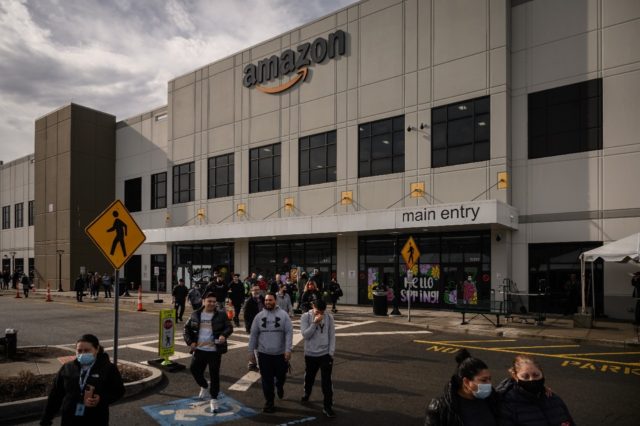Amazon workers in New York voted Friday to launch the first US union at the e-commerce giant, an underdog upset against a company that has steadfastly opposed organized labor in its massive workforce.
Dozens of supporters greeted the result with cheers and applause, while union organizer Christian Smalls popped a champagne cork in front of bank of TV cameras and photographers.
“We want to thank (Amazon founder) Jeff Bezos for going to space because while he was up there we were signing people up,” Smalls joked after workers at the Staten Island JFK8 warehouse backed the union 2,654 to 2,131 votes.
Analysts said the Amazon outcome — likened to a David vs Goliath upset and winning plaudits from President Joe Biden — could spur other unionization effort at America’s second larget private employer.
Amazon noted “disappointment” over the results, and said it was evaluating its options, including “filing objections based on the inappropriate and undue influence” of the National Labor Relations Board, which oversaw the vote.
At stake was Amazon’s ability to remain union-free in its home market, a status it has guarded fiercely since the company was set up in the 1990s by Bezos, who has since started a space tourism venture.
During a contentious campaign, Amazon argued that forming a union would mar the company’s direct relationship with workers and represent a jump into the unknown, with no guarantee employees will wind up with better wages or job security.
But union leaders, composed of current and former Staten Island employees, spoke constantly with employees, pitching the ability of a union to improve working conditions and ensure more employee-friendly work schedules without risk of being fired.
Smalls, 33, launched the drive soon after being fired from the Amazon site in Staten Island in March 2020 after organizing a protest for personal protective equipment amid the surge of the first major Covid-19 outbreak in New York.
“It’s a truly historic day, it really is,” said Eric Milner, who represented the union organizers during the process. “I think it’s going to start a chain reaction — warehouse to warehouse.”
Also cheering was Biden, a self-professed “union guy.”
“The president was glad to see workers ensure their voices are heard with respect to important workplace decisions,” Press Secretary Jen Psaki said.
Chain reaction?
The union victory in New York came as a second election remained up in the air in the southern state of Alabama.
The vote is a redo of a 2021 ballot thrown out by federal officials, with 993 workers casting ballots against the labor group, compared with 875 employees in favor.
But there were 416 “challenged” ballots, according to the National Labor Relations Board, meaning the number of votes still to be settled is big enough to potentially decide the final result.
The Alabama campaign had garnered support from the Retail, Wholesale and Department Store Union, a national union, and enjoyed visits by high-profile politicians such as progressive Senator Bernie Saunders.
By contrast, the New York campaign, while based in a part of the United States historically favorable to unions, was a grass roots effort with a hardscrabble budget.
Ruth Milkman, a sociologist of labor movements at City University of New York, said she was “stunned but delighted” by the outcome, which will “inspire” other campaigns.”
Despite recent unionization victories at Starbucks, the general picture for organized labor in the United States is mixed, with overall unionization levels falling steadily.
“It seems that most of the attention has been focused on Alabama and people kind of dismissed this one because it wasn’t an established union,” Milkman said. “And yet it turned out to be the success story.”
Neil Saunders, an analyst at GlobalData Retail, agreed that the New York victory will embolden others to unionize.
“It becomes much more difficult for Amazon to operate if they have to deal with a union,” said Saunders. “They’re not going to necessarily have to spend a lot more. It’s just that they don’t like the interference of unions.”
In the immediate near-term, Staten Island organizers were already mobilizing for their next battle: the LDJ5 sorting center across the street from the JFK8 warehouse, with a vote will be held there at the end of the month.
Also ahead, Smalls and other labor leaders will begin to focus on establishing a contract with Amazon, an objective that is expected to be challenging.
“There is still a lot of hard work ahead,” said Milkman. “Many times people win election and never get a contract.”
Achieving a contract “will require a continued, if not expanded, campaign,” said Larry Mishel, a fellow at the Economic Policy Institute, a labor-backed think tank.

COMMENTS
Please let us know if you're having issues with commenting.